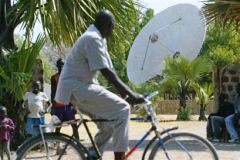Peace deal generates business buzz in devastated southern Sudan
By RODRIQUE NGOWI, Associated Press Writer
RUMBEK, Sudan, Jan 22, 2005 (AP) — The narrow gravel airstrip in this dusty, desolate town has been a hive of activity since rebel and government leaders signed a historic peace accord this month officially ending Africa’s longest running civil war.

|
|
A man cycles past a sattelite dish, Thursday, Jan. 20, 2005 of Network of the World, the first cellphone operator in Rumbek in southern Sudan. (AP). |
Businessmen, aid workers and diplomats have rushed to set up a presence in what is set to become the provisional capital of an autonomous government for southern Sudan.
“We have certainly never seen anything like this size of influx before,” said Terry Light, from Ithaca, N.Y., one of the first foreign businessmen to set up here 14 years ago. He runs a tented camp next to the airstrip – Rumbek’s version of a luxury hotel.
Light, head of Africa Expeditions Ltd., was forced to charter flights to bring in food and supplies to keep up with the rush this week, part of the increased business seen here since the signing of the peace accord Jan. 9.
Glancing at a polished artillery shell dangling from a chain above the camp’s thatch bar, he sounded optimistic about the future of his $500,000 investment in the region, devastated by 21 years of fighting.
“The peace is going to bring all kinds of business activity,” he said.
The British and Dutch embassies this week opened a joint liaison office in the sprawling town of scattered thatch huts 560 miles south of the capital, Khartoum, which the rebel Sudan People’s Liberation Army has made its headquarters.
“This is really donors’ effort to establish an operational presence in the south to facilitate the implementation of the peace agreement,” Dutch Ambassador Adriaan Kooijmans said at the new brick office located on the grounds of Light’s tented camp.
Not far away, business is booming at Richard Herbert’s new cell phone and construction companies.
The government started to introduce phone service here in the 1980s, but its troops bombed the giant satellite dish that would have made it possible after fighting broke out with the SPLA rebels in 1983.
Now rebel officials, aid workers and others are lining up to buy air time and use the Internet services at Herbert’s Network of the World, which opened its doors in August.
All the activity means new opportunities for Rumbek’s 50,000 people – most of whom survive on far less than $1 a day.
Samuel Makuac spent 18 years working in military communications for the rebels. He is now assistant manager for airtime sales with Network of the World.
“Peace has come, and we are coming back to town for employment – and to enjoy its beauty,” Makuac said.
Herbert’s two companies – whose shareholders include the rebels’ political wing, the Sudan People’s Liberation Movement – employ just under 50 people.
They include disabled rebel fighters who now earn about $7 a week – a small fortune here – as casual laborers at the construction site.
But the investment so far – just three foreign companies operate in southern Sudan – pales in comparison with the devastation inflicted by the war pitting the Arab Muslim-dominated government in the north against African Christians and animists in the south seeking greater autonomy and a greater share of the country’s wealth.
More than 2 million were killed. Hospitals, schools and homes were torched, and fertile farmland infested with land mines.
Foreign donors have pledged hundreds of millions in aid – but many want to see progress resolving a separate conflict in Sudan’s western Darfur region before releasing the funds.
Other companies are expected to come in after insurgents form their new government in the next six months. But the challenges they face are daunting.
Vast areas are mined, and the dirt roads that crisscross the region’s forests, mountains, grasslands and swamps are in acute disrepair.
Satellite dishes, cables, generators, computers, a telecommunications mast and air conditioning units all had to be trucked or flown in from neighboring countries to set up Herbert’s cell phone company. Technical expertise is scarce, and engineers also had to be brought in.
Then there was the question of finding a telecommunications company willing to provide switching services for international calls when none recognized the rebel movement as a legitimate authority. A Canadian company finally agreed to provide the critical service. Herbert did not disclose its name.
Insurance companies refuse to cover investments here, but for Herbert, Light and others, the business potential was too tempting to ignore.
“We recognized that demand was going to grow, so we stuck our necks out and decided to invest,” Light said.
